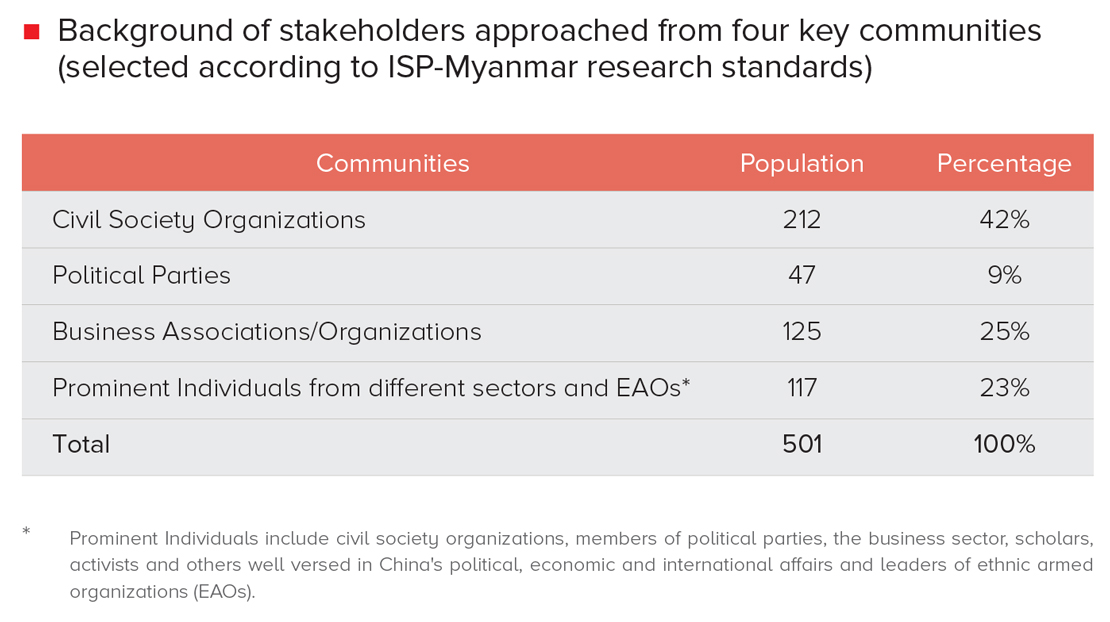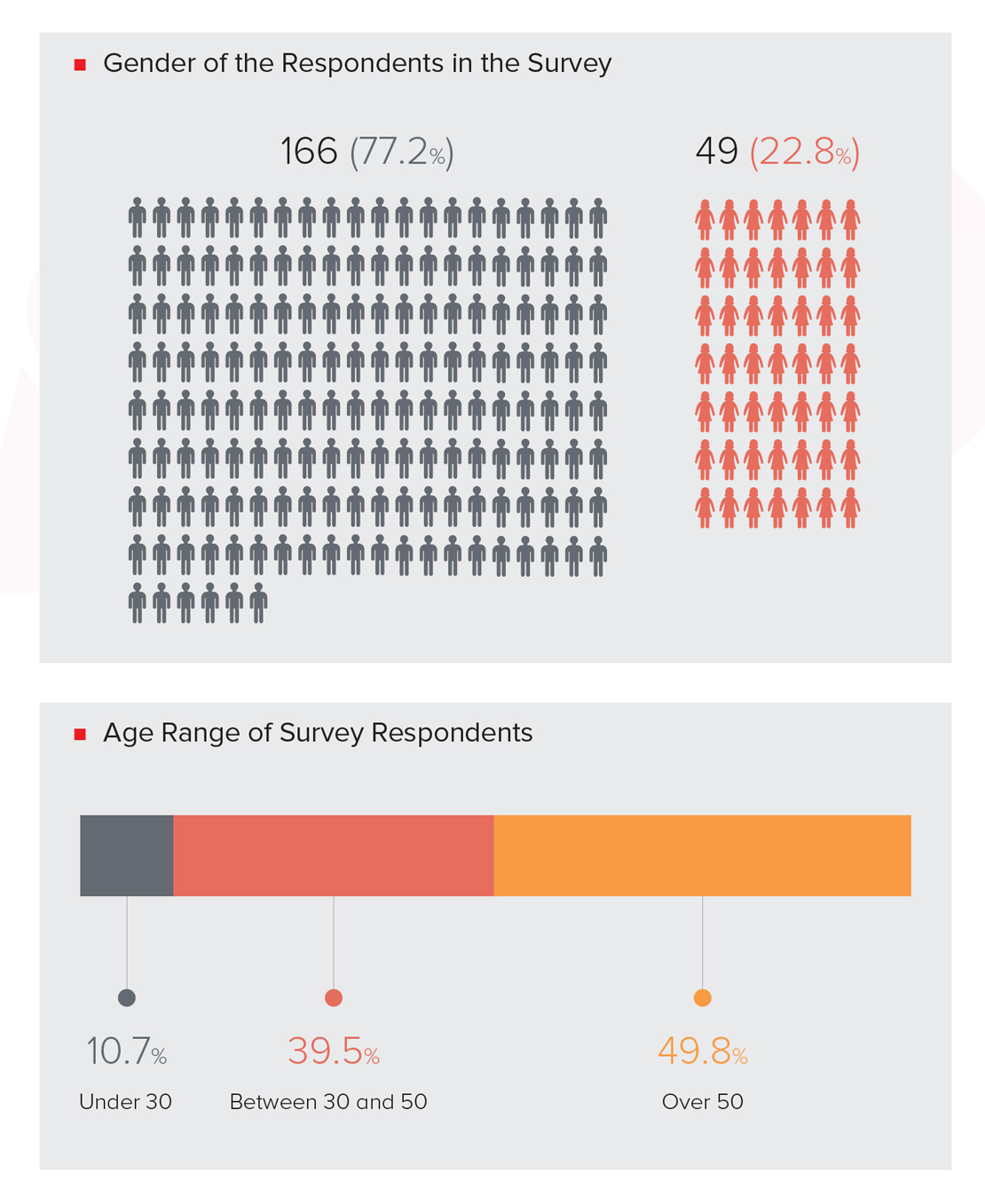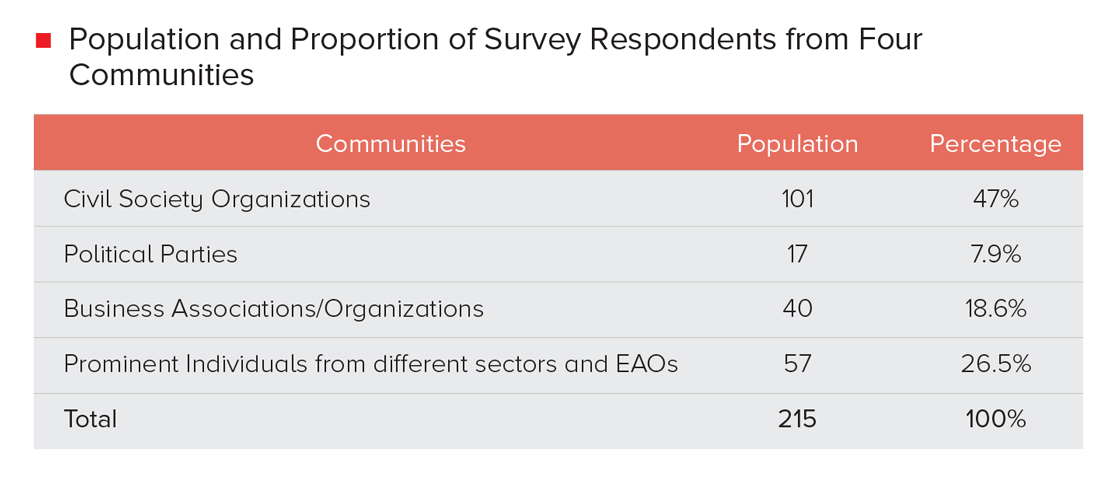Myanmar’s Key Stakeholders and their Perceptions of Sino-Myanmar Relations – A Survey
One year after the 2021 military coup, ISP-Myanmar initiated a research survey of Myanmar’s Key Stakeholders and their Perceptions of Sino-Myanmar relations with technical support from the People’s Alliance for Credible Elections (PACE). The initiative aims to collect specific knowledge of key individuals from the Myanmar policy communities to identify similarities and differences in their views about the key factors shaping Sino-Myanmar relations. In particular, the study aims to comprehend the different interpretations of 1) the roles played by China in Myanmar’s political arena after the military coup, 2) the long-running deadlock in the peace process in which China remains involved, 3) the impacts of China’s investment and trade, 4) China-Myanmar Economic Corridor (CMEC) projects, and 5) humanitarian aid provided by China during Covid pandemic.
In addition, it also sets out to understand how various stakeholders in Myanmar perceive China’s efforts to develop its soft power and the prevalence of China produced technology (mobile phones, applications, and security threat of the electronic devices) in Myanmar.
The key stakeholders include civil society organizations, members of political parties, the business sector, scholars, activists, leaders of ethnic armed organizations (EAOs) and others well versed in China’s political, economic and international affairs. ISP-Myanmar’s findings aim to contribute to the policy-making and program implementation of organizations involved in Sino- Myanmar relations.
Data Collection Methods
In this research survey, ISP-Myanmar employed a quantitative research methodology implemented in three steps. The first step of pre-survey preparation involved constructing of a sampling frame, identifying potential participants, and collecting information about selected participants, formu-lating research questions, and training interviewers. The second step in¬volved conducting survey interviews with voluntary participants from differ¬ent policy communities. The third step involved data compilation, data entry, data analysis process, and writing.
For the pre-survey preparation and construction of the sampling frame, ISP-Myanmar and PACE worked together to formulate the survey’s objectives and its framework, to select methods for analysis, as well as to prepare survey questions. Then, the team selected a sampling frame for the sample population of survey participants and developed a schemata for classifying them according to their backgrounds. This stage involved in-person and online consultations (at least 20 online) with experts and leaders from civil society organizations, political parties and the business sector to discuss the selection of potential survey participants. These meetings included more than 30 individuals from different sectors.
Awareness of Sino- Myanmar relations was the main criteria for selecting survey participants. For this reason, it was impossible to randomly sample the survey population, which is a common method for surveys. Therefore, ISP-Myanmar applied a purposive sampling method to categorize survey participants, and the sampling was based on one’s capacity to influence policies related to Sino-Myanmar relations. Using this selection framework, 340 participants were initially selected to take the survey. However, due to the political situation in Myanmar, not all of these individuals could partici¬pate. Prospective interviewees were selected again according to the same standards. Out of total of 501 individuals who were approached for the sur¬vey, 215 completed the survey.
The table presents four communities involved in Sino-Myanmar relations. They are (1) Civil Society Organizations, (2) Political Parties, (3) Business Associations/Organizations and (4) Prominent Individuals, Scholars, Professionals, and Leaders of Ethnic Armed Organizations (EAOs), as well as influential people from social and religious organizations. To select the survey participants, the survey team considered the recommendations made by the key experts after consulting with them at least 20 times with 30 individuals from different sectors. These key experts made their recommendations based on the individual’s professional background, level of expertise in Sino-Myanmar relations, and level of engagement with China and their influence on Sino-Myanmar policy issues.

The survey team selected members from 47 political parties that won seats in national and local legislatures (Hluttaw) in 2015 and 2020 and that are located in Kachin State, Shan State, Mandalay Region, Magway Region and Rakhine State. The latter are from areas where the Chinese-govern¬ment-financed China-Myanmar Economic Corridor (CMEC) project will take place.
The team also selected 212 individuals from civil society organizations that are 1) working on research projects related to Sino-Myanmar relations; 2) monitoring Chinese-financed projects and their impacts on environmental and land issues; and 3) supporting the rights of local communities.
The research team also approached a total of 125 business associations/ organizations directly involved in the CMEC (especially those involved in investment and trade projects). This selection was based on data received from the Union of Myanmar Federation of Chambers of Commerce and In¬dustry (UMFCCI).
Moreover, the survey team selected 117 individuals working on research related to Sino-Myanmar relations, well-known scholars and professionals influencing policy issues, activists, leaders of EAOs and influential persons from social and religious groups.
To carefully analyze the role of China in different sectors of Myanmar, survey participants were selected from areas with the following features, areas where CMEC projects are slated to take place, areas with strong economic ties to China, and areas where projects strategic to China already exist. Therefore, the number of participants from each area are not evenly distributed.


In the survey, the selection of participants was aimed to ensure gender par¬ity. However, an equal gender balance amongst survey participants was not possible due to the following conditions: the majority of the community lead¬ers selected based on the China expertise criteria are men, and surveyors were not able to reach many women leaders because of the need to take precautions following the military coup. Despite these unfavorable condi¬tions, among the 501 contacts, 215 people participated in the survey – 166 men (77.2 percent) and 49 women (22.8 percent).
The preparations to mitigate against potential biases in interviews, any risks posed by post-coup security situation, and the COVID-19 pandemic included the following: 1) The development of a manual for survey enumer¬ators and their supervisors to follow and 2) 9 out of 11 enumerators received in-person training before their deployment for the survey.
During the second stage, individual interviews were conducted from 17 Feb¬ruary 2022 to 12 March 2022. ISP-Myanmar interviewed 215 individuals out of 501 individuals, who were initially selected from four communities.
Among them, 47 percent are from CSOs, 26.5 percent are prominent indi¬viduals such as scholars, professionals, activists, respected individuals from social and religious groups, and leaders of EAOs. 20 percent are from Busi¬ness Associations/Organizations and 7.4 percent are from political parties.
Although ISP-Myanmar’s team initially decided to conduct interviews in per¬son, (but given concerns posed) by Covid-19 and instability relating to the coup, the survey team decided that online interviews, using Zoom, were appropriate. Those unable to attend an interview via Zoom were asked to fill out a form. Of 215 survey respondents, 187 were interviewed via Zoom, and 28 respondents answered by a form.
In the third stage of data collection, from 13-25 March 2022, the data from respondents was first recorded on the response sheets, then later stored as digital records in a database. Later data assistants from ISP-Myanmar and PACE independently checked and verified the data twice. The responses of each interviewee were codified and reviewed using specialized software. If an error was detected, a full review of the original documents was conducted and corrected if necessary.

